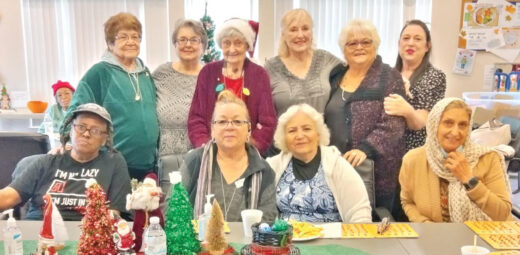
Dec 07Do Resident Services Work? They Do -Take Sarah’s Word for It!
Mercy Housing’s Resident Services programs are all about equipping residents with the best tools to change their own lives. Just ask Sarah Peralta, a 17-year Mercy Housing California (MHC) employee and Senior Resident Services Coordinator at two affordable communities in Folsom, California.

“I always tell residents and partners that if you participate in Mercy Housing programs, they really do work – because I am a product of their programs,” said Sarah, who was once an MHC resident participating in Resident Services programming.
Sarah moved to the 10-building apartment complex that would one day be Mercy Village Folsom in 1993 when her husband was incarcerated at the nearby Folsom State Prison. At the time, the community was commonly referred to as “Prison Wife Row,” about the many families of incarcerated people living there. In 1997, MHC purchased and rehabilitated the property and began providing free, onsite resident services. Despite facing many challenges, including being separated from her husband, grappling with substance use disorder, and working through traumas from her childhood, Sarah was resolute in her pursuit of a more stable life for herself and her daughter and son. Encouraged by Mercy Housing staff, she took the opportunity to sign up for programs that could improve their circumstances, including resume workshops, a GED program, and a homebuyer’s program. She later moved to Folsom Gardens, a nearby MHC community.
“In my life, no one ever had believed in me,” said Sarah, who has since earned her GED and purchased her own mobile home. “Everyone shuts you out when you’re a prison family… but the staff at Folsom Gardens really [invested in] me. They said ‘Sarah, you can do it,’ and they believed in me. If you knew me before and you know me now, you’d see I’m a different person.”
After a few years spent getting to know the staff and working hard in various financial stability programs, Sarah was approached by MHC’s Vice President of Resident Services, Alvin Tuvilla, who asked her to apply for a job on his team.
“He said, you might not have a credential, but you have the knowledge, you have the know-how, and you have the ability to form relationships with residents that can be more important than any degree,” recalled Sarah, who took Alvin’s advice and got her first job with Mercy Housing in 2006. She is now the Senior Resident Services Coordinator at Folsom Gardens, where her daughter resides, as well as Creekview Manor, a senior community.
“Every day, I try to give back to what I came out of,” said Sarah. From partnering with the local Boys and Girls Club to bring in mentorship opportunities for youth, to improving food security for seniors, she now leads programs that can make a permanent impact on residents’ lives.
She’s launched a weekly reading circle at Folsom Gardens and connected many children to resources that have helped them fare better at school.
“One of the kids I’ve worked with for a long time is in college now, and she just made the Dean’s List,” Sarah remarked with pride. At Creekview Manor, she’s been focused on programs that will help seniors reacclimate to social life after isolating at the start of the pandemic.

Sarah is especially attuned to the needs of families impacted by incarceration. Today, some of the apartments at Folsom Gardens remain reserved for households with an incarcerated family member, serving an important need: people who have been incarcerated are more than 10 times more likely to experience homelessness than those who haven’t, and 79% of people with criminal convictions report that they or their loved ones have experienced housing discrimination (Sources: Prison Policy Initiative, Who Pays Report). In addition to her work at Mercy Housing, she’s founded a nonprofit with her daughter Heather called H.A.S. Hope (“Heather And Sarah Hope”), to provide nutrition assistance and other forms of support for families of people who are serving sentences.
“I want to help break generational cycles, just like my family broke the cycle of incarceration,” said Sarah. “I want to make sure people have a chance at living their life, not just surviving. If I can reach just one kid, I’ve done my job. I want to give them tools that are going to change their perception.”
You may also like:
- The Future is Going to Be EPIC for Grant Award Winner Alaynai We are honored to partner with the National Real Estate Practice of EPIC Insurance Brokers...
Stay Up To Date
Get news on Mercy Housing and inspiring stories of change delivered to your inbox.


